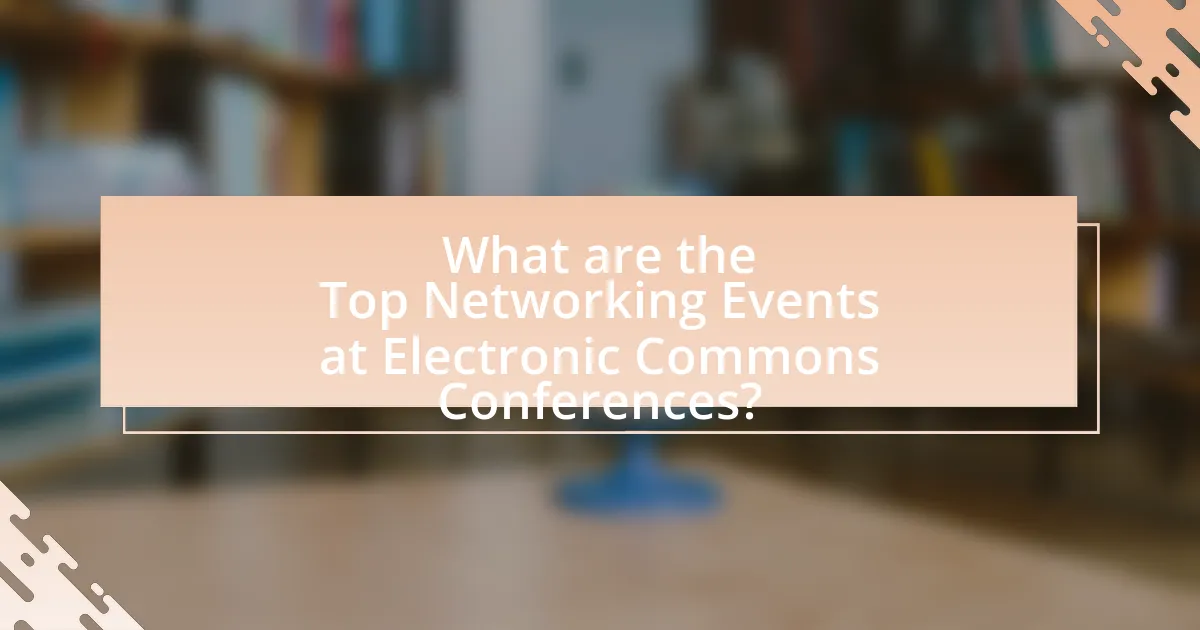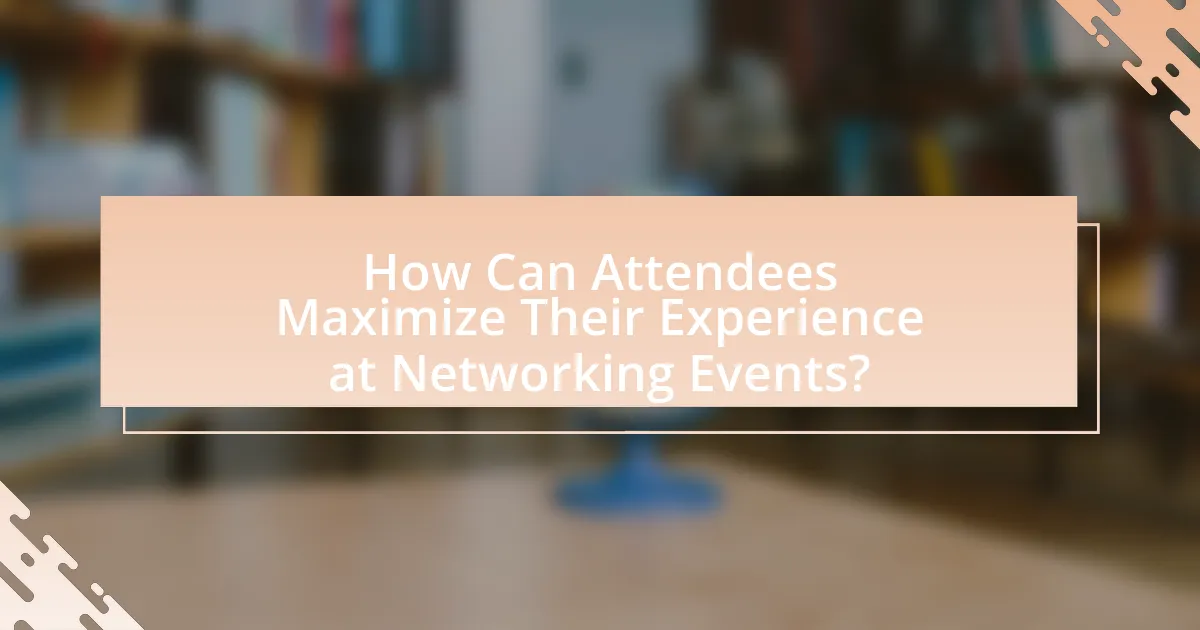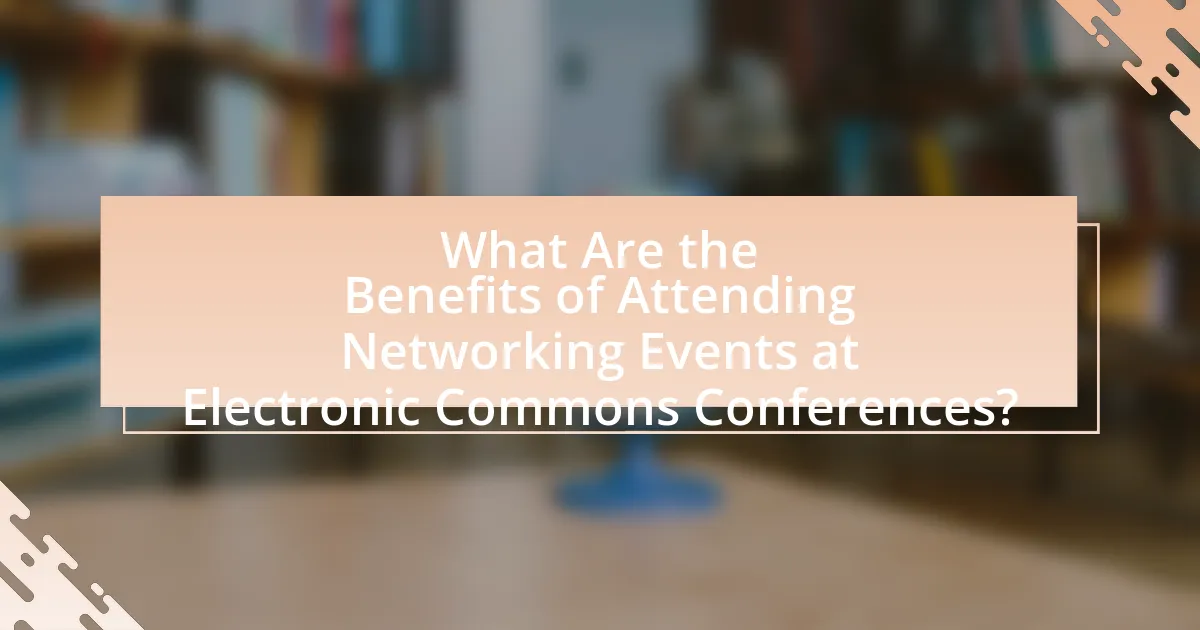The article focuses on the top networking events at Electronic Commons Conferences, highlighting key activities such as the Welcome Reception, Panel Discussions, and Networking Lunches. These events are essential for fostering professional relationships, facilitating collaboration, and enhancing knowledge sharing among attendees in the electronic commons field. The article also discusses the importance of preparation and engagement strategies for maximizing networking opportunities, as well as the benefits of attending these events for career advancement and mentorship. Additionally, it outlines common mistakes to avoid and resources available for improving networking skills.

What are the Top Networking Events at Electronic Commons Conferences?
The top networking events at Electronic Commons Conferences include the Welcome Reception, Panel Discussions, and Networking Lunches. The Welcome Reception serves as an initial gathering point for attendees to meet and connect, fostering relationships from the outset. Panel Discussions provide opportunities for interaction between speakers and participants, allowing for deeper engagement on relevant topics. Networking Lunches facilitate informal conversations and connections among attendees, enhancing collaboration and knowledge sharing. These events are designed to maximize networking potential, as evidenced by participant feedback highlighting increased professional connections and collaborative opportunities.
Why are Networking Events Important at Electronic Commons Conferences?
Networking events are important at Electronic Commons Conferences because they facilitate collaboration and knowledge sharing among professionals in the electronic commons field. These events provide opportunities for attendees to connect with peers, share insights, and discuss emerging trends, which can lead to innovative solutions and partnerships. Research indicates that networking can significantly enhance career development and project success, as 70% of jobs are found through networking, according to a study by the Social Capital Research Network. Additionally, networking fosters a sense of community, encouraging ongoing dialogue and support among participants, which is crucial for the advancement of electronic commons initiatives.
How do Networking Events Enhance Professional Relationships?
Networking events enhance professional relationships by providing opportunities for individuals to connect, share knowledge, and collaborate. These events facilitate face-to-face interactions, which are crucial for building trust and rapport among professionals. According to a study published in the Journal of Business Research, 70% of professionals reported that networking events significantly improved their ability to form meaningful connections. Additionally, networking events often feature industry leaders and experts, allowing attendees to gain insights and establish contacts that can lead to future collaborations or job opportunities.
What Opportunities Do Networking Events Provide for Collaboration?
Networking events provide opportunities for collaboration by facilitating connections among professionals, fostering partnerships, and encouraging knowledge sharing. These events allow individuals to meet potential collaborators, share ideas, and explore joint ventures, which can lead to innovative projects and solutions. According to a study by the Harvard Business Review, 70% of jobs are found through networking, highlighting the importance of these events in creating collaborative opportunities. Additionally, networking events often feature workshops and panel discussions that promote collaborative learning and problem-solving, further enhancing the potential for partnerships.
What Types of Networking Events Can Attendees Expect?
Attendees can expect various types of networking events at Electronic Commons Conferences, including panel discussions, workshops, roundtable sessions, and informal meet-and-greets. Panel discussions typically feature industry experts sharing insights, while workshops provide hands-on learning experiences. Roundtable sessions encourage in-depth conversations among participants on specific topics, fostering collaboration. Informal meet-and-greets allow attendees to connect in a relaxed environment, enhancing relationship-building opportunities. These formats are designed to facilitate meaningful interactions and knowledge exchange among professionals in the electronic commons field.
What are the Key Features of Panel Discussions?
Panel discussions are characterized by several key features that enhance audience engagement and knowledge sharing. Firstly, they typically involve a diverse group of experts who present varying perspectives on a specific topic, fostering a rich dialogue. Secondly, panel discussions often include a moderator who guides the conversation, ensuring that all panelists contribute and that the discussion remains focused. Additionally, audience interaction is a crucial element, as attendees are usually encouraged to ask questions, which promotes a dynamic exchange of ideas. Lastly, panel discussions are time-bound, with a set duration that allows for concise presentations and discussions, making them efficient for conveying information. These features collectively contribute to the effectiveness of panel discussions as a format for exploring complex subjects in a collaborative environment.
How do Workshops Facilitate Networking Among Participants?
Workshops facilitate networking among participants by creating structured environments that encourage interaction and collaboration. In these settings, participants engage in hands-on activities, discussions, and group projects, which naturally lead to relationship-building. Research indicates that 70% of professionals believe workshops enhance their networking opportunities, as they provide a platform for individuals to share expertise and connect over common interests. Additionally, the informal atmosphere of workshops often breaks down barriers, making it easier for participants to initiate conversations and form connections that can extend beyond the event.

How Can Attendees Maximize Their Experience at Networking Events?
Attendees can maximize their experience at networking events by actively engaging with other participants and preparing in advance. Engaging includes initiating conversations, asking questions, and following up with contacts after the event. Preparation involves researching attendees and speakers, setting specific goals for networking, and having business cards ready. According to a study by the Harvard Business Review, effective networking can lead to a 50% increase in job opportunities, highlighting the importance of proactive engagement and preparation in achieving networking success.
What Strategies Should Attendees Use to Prepare for Networking Events?
Attendees should research the event and its participants to prepare effectively for networking events. Understanding the background of speakers and other attendees allows individuals to tailor their conversations and identify potential connections. Additionally, attendees should practice their elevator pitch, which succinctly communicates their professional background and goals, making it easier to engage with others. According to a study by the Harvard Business Review, effective networking can lead to increased job opportunities and professional growth, highlighting the importance of preparation.
How Can Attendees Effectively Introduce Themselves?
Attendees can effectively introduce themselves by clearly stating their name, role, and organization, followed by a brief description of their professional background or interests. This structured approach allows for concise communication and helps establish context for the conversation. For example, saying “I am Jane Doe, a software engineer at Tech Innovations, specializing in AI development” provides essential information that can facilitate further discussion. Research indicates that effective self-introductions enhance networking opportunities, as they create a memorable first impression and encourage engagement among participants.
What Follow-Up Actions Should Attendees Take After the Event?
Attendees should send personalized thank-you emails to speakers and key contacts after the event. This action fosters relationships and shows appreciation for their insights. Additionally, attendees should connect with new contacts on professional networking platforms like LinkedIn, which enhances networking opportunities and keeps communication channels open. Following up with any promised resources or information discussed during the event is also crucial, as it demonstrates reliability and reinforces connections made. Engaging in discussions about the event on social media can further amplify visibility and maintain engagement with the community.
What Common Mistakes Should Attendees Avoid at Networking Events?
Attendees should avoid being unprepared at networking events. Preparation includes researching attendees, having a clear elevator pitch, and bringing business cards. A study by the Harvard Business Review indicates that networking effectiveness increases significantly when individuals have a strategy and know their goals, leading to more meaningful connections. Additionally, attendees should refrain from dominating conversations, as effective networking relies on mutual exchange; research shows that active listening fosters better relationships. Lastly, attendees must avoid neglecting follow-ups, as 80% of networking success comes from maintaining connections after the event, according to a report by the Networking Institute.
How Can Overcoming Nervousness Improve Networking Success?
Overcoming nervousness can significantly improve networking success by enhancing confidence and communication skills. When individuals manage their anxiety, they are more likely to engage in meaningful conversations, make a positive impression, and establish valuable connections. Research indicates that confident individuals are perceived as more competent and trustworthy, which can lead to increased opportunities in professional settings. For instance, a study published in the Journal of Applied Psychology found that individuals who exhibit confidence during networking events are more likely to receive follow-up communication and job offers. Therefore, addressing nervousness directly correlates with improved networking outcomes.
What Should Attendees Avoid Discussing During Networking?
Attendees should avoid discussing controversial topics such as politics, religion, and personal finances during networking. Engaging in these subjects can lead to discomfort or conflict, which may hinder relationship-building. Research indicates that conversations around neutral topics, such as industry trends or shared interests, foster a more positive networking environment and enhance connections.

What Are the Benefits of Attending Networking Events at Electronic Commons Conferences?
Attending networking events at Electronic Commons Conferences provides significant opportunities for professional growth and collaboration. These events facilitate connections with industry leaders, peers, and potential collaborators, enhancing knowledge sharing and fostering partnerships. Research indicates that 85% of jobs are filled through networking, highlighting the importance of building relationships in professional settings. Additionally, participants gain insights into emerging trends and technologies, which can inform their work and drive innovation. Networking events also often feature workshops and discussions led by experts, further enriching the attendee experience and providing actionable takeaways.
How Do Networking Events Contribute to Career Advancement?
Networking events significantly contribute to career advancement by facilitating connections between professionals and potential employers. These events provide opportunities for individuals to showcase their skills, share knowledge, and build relationships that can lead to job offers or collaborations. According to a survey by LinkedIn, 85% of jobs are filled through networking, highlighting the importance of personal connections in the job market. Additionally, networking events often feature industry leaders as speakers, offering insights and mentorship that can enhance career growth.
What Role Does Networking Play in Finding Job Opportunities?
Networking plays a crucial role in finding job opportunities by facilitating connections between job seekers and potential employers. Through networking, individuals can access the hidden job market, where many positions are filled through referrals rather than traditional job postings. Research indicates that approximately 70% of jobs are not advertised publicly, highlighting the importance of personal connections in job searches. Additionally, networking allows job seekers to gain insights into industry trends and company cultures, which can enhance their job applications and interviews.
How Can Networking Lead to Mentorship Opportunities?
Networking can lead to mentorship opportunities by facilitating connections between individuals seeking guidance and experienced professionals willing to share their knowledge. When individuals attend networking events, such as those at Electronic Commons Conferences, they engage in conversations that can reveal shared interests and goals, making it easier to identify potential mentors. Research indicates that 70% of people find their mentors through networking, highlighting the effectiveness of personal connections in establishing mentorship relationships.
What Resources Are Available for Attendees to Enhance Their Networking Skills?
Attendees can enhance their networking skills through various resources such as workshops, networking sessions, and online platforms. Workshops often focus on effective communication, relationship-building strategies, and personal branding, providing attendees with practical skills. Networking sessions at conferences facilitate direct interaction with peers and industry leaders, allowing for real-time practice of networking techniques. Additionally, online platforms like LinkedIn offer tools for connecting with professionals, sharing insights, and participating in discussions, further enhancing networking capabilities. These resources collectively support attendees in developing and refining their networking skills in a structured environment.
What Online Platforms Can Help Attendees Connect Before the Event?
Online platforms that can help attendees connect before the event include LinkedIn, Facebook Groups, and event-specific applications like Whova and Eventbrite. LinkedIn allows users to network professionally, join relevant groups, and engage in discussions related to the event. Facebook Groups provide a space for attendees to share information and connect informally. Whova and Eventbrite offer features that facilitate attendee interaction, such as discussion boards and attendee lists, enhancing networking opportunities prior to the event. These platforms are widely used and recognized for their effectiveness in fostering connections among participants.
How Can Attendees Utilize Social Media for Networking Purposes?
Attendees can utilize social media for networking purposes by actively engaging with event hashtags and connecting with other participants online. By using platforms like Twitter, LinkedIn, and Instagram, attendees can share insights, ask questions, and follow speakers or organizations related to the conference. This approach not only enhances visibility but also fosters relationships with peers and industry leaders. Research indicates that 79% of marketers say that user-generated content has a significant impact on their brand engagement, highlighting the effectiveness of social media interactions in building professional networks.
What Tips Can Help Attendees Make the Most of Networking Events?
To make the most of networking events, attendees should prepare in advance by researching participants and setting specific goals for what they want to achieve. This preparation allows individuals to engage meaningfully with others, fostering valuable connections. Studies show that attendees who set clear objectives are more likely to follow up and maintain relationships, enhancing their networking effectiveness. Additionally, practicing active listening and asking open-ended questions can facilitate deeper conversations, making interactions more impactful.